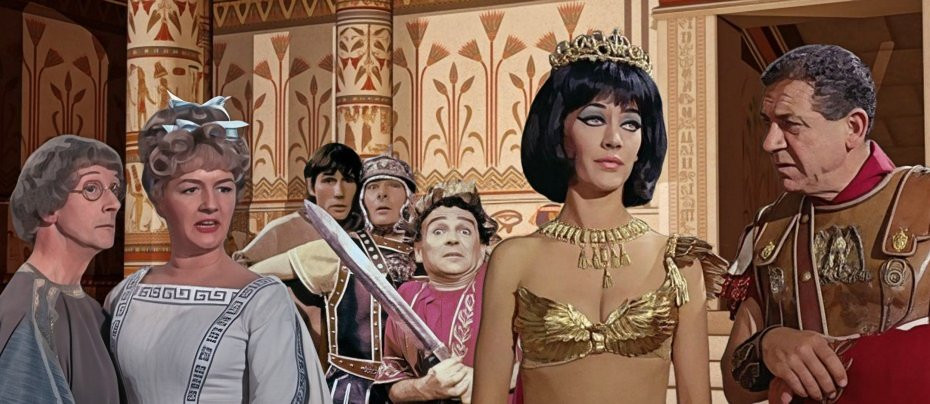
Warren Mitchell
‘Mitchell will be remembered as a talented actor whose range went far beyond that of a small-minded pensioner angry at the changing world around him’
By Brian Slade
Not every actor can rise above the fear of typecasting, particularly in comedy. Some will run from their comic creation to avoid such an outcome while others will battle stoically to shed the skin of their most famous role. But one man not only accepted the role that made his fortune, but he embraced it for the majority of his career, despite loathing the views of his character’s bigoted mind. That man was the inimitable Warren Mitchell.
Warren Misell (his name was subsequently anglicised) was born to Monty and Annie Misell in 1926 in Stoke Newington. His grandmother was a Russian Jew who arrived in Britain in 1910 and opened a fish and chip shop in the area. She would later tell Warren that owning such a venue was always going to pay off as people would have fish and chips during both good times and bad. She was less enthused about his acting desires, refusing to allow him to appear in a school production of A Christmas Carol because the Christmas pudding he would have to eat was not kosher. His mother was more encouraging, allowing young Warren to enter Gladys Gordon’s Academy of Dramatic Arts.
Alas for Warren, his mother would not live to see the fruits of his labour. She passed away when he was just 15 years old. His father was left to raise him in a flat.
The war would inevitably intervene with Mitchell’s career aspirations. As he prepared to be trained as a flight navigator with the RAF, he qualified in physical chemistry at University College, Oxford before being shipped off to Canada. Close pals with him during his time in the forces was Richard Burton, who inspired Warren to enter into acting. Upon his return, he enrolled at RADA and would try a number of industries to find an income in his spare time, including working as a porter and in an ice-cream factory.
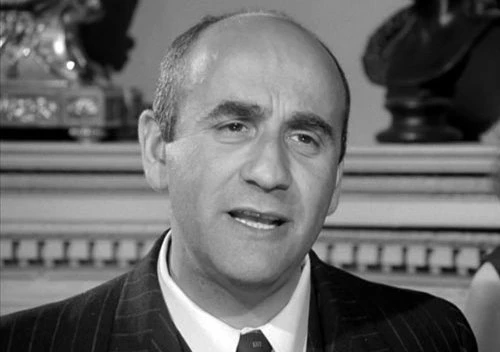
In 1951, Mitchell would marry his soul mate, little-known actress Constance Wake, to whom he would remain married for the rest of his life. As befitted their mandatorily frugal life at the time, they held their reception in a King’s Cross café. What hurt Mitchell more was the initial refusal of his father to accept Connie into the family, owing to his Jewish faith and her being a gentile.
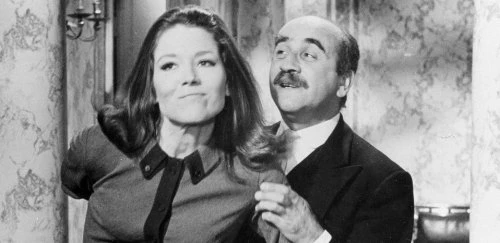
Mitchell progressed through radio to television, where he began to find a good deal of work as a character actor, albeit he bemoaned that most of the time he was expected to take on the role of the bad guy in the dramas of the day. But he was also earning a decent reputation supporting comedians like Tony Hancock, Benny Hill and Alfie Bass, the latter in Bootsie and Snudge.
Mitchell’s comedic talents eventually led to a few efforts in Comedy Playhouse, where pilot episodes of potential sitcoms were aired to see what found an audience. He tried two early efforts that went unnoticed - Clicquot et Fils, a comedy starring Eric Sykes as an undertaker in France paying actors to pose as relatives at funerals, and The Channel Swimmer, starring Michael Brennan, Frank Thornton and Bob Todd. While these two efforts didn’t take, the next effort in 1965, Till Death Us Do Part, changed Warren Mitchell’s life forever.
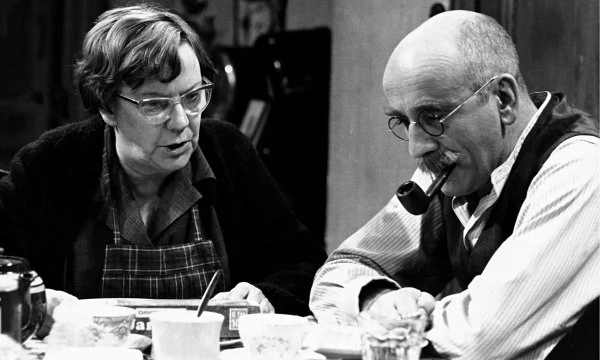
Initially co-starring Gretchen Franklin in the pilot episode, Mitchell of course played Alf Garnett (although he was Alf Ramsey in the pilot) and his long-suffering wife Else was made famous by Dandy Nichols. Alf was a bigoted Conservative whose opinions on most subjects, particularly race, were outspoken and aired in relentless rants…except of course for British institutions like the Royal Family, when he became rather more subservient.
Till Death Us Do Part ran sporadically across seven series and ten years and it made Mitchell a household name, as well as earning him enough money to buy a house of his own. But for every bit of fame it brough him, it brought him criticism. Writer Johnny Speight insisted, as did Mitchell, that Alf’s outspokenness was designed to show him up for the bigot that he was. The audience was expected to laugh at him rather than applaud. Unfortunately, that wasn’t always the case, and so Mitchell began to find himself having to defend both his own views and the character of Alf.
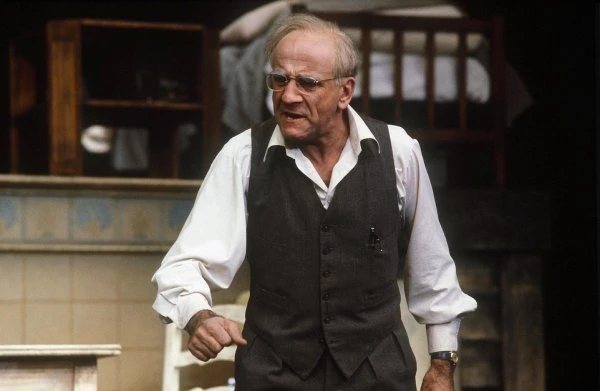
Garnett’s rantings were a huge success, but Till Death Us Do Part eventually came to an end in 1975. It gave Mitchell a chance to flex his theatrical muscles, something he did to great acclaim in Arthur Miller’s Death of a Salesman, his performance as the beleaguered Willy Loman earning him the praise of the author himself and a multitude of awards, including the Laurence Oliver Award.
But the lure of the controversial Garnett was never far away. It seemed that if Speight was prepared to write more, and programme commissioners were prepared to give him airtime, Mitchell was happy enough to don his hat and West Ham scarf and continue to play the role. A switch to the commercial channels was unsuccessful, one series simply called Till Death… in which Else and Alf have retired to Eastbourne, failed at ATV. But a few years later, Garnett was back in London and on the BBC for a run of another seven series, albeit only one with Else as Nichols passed away in 1986. In Sickness and in Health continued Alf’s opinionated tirade against pretty much anything, but challenged more directly as he received care from a gay black social worker, Winston (Eamonn Walker).
Garnett was a machine. He made Mitchell popular in Australia, leading him to eventually obtain dual citizenship there. His stage show, The Thoughts of Chairman Alf, also penned by Speight had been a success for many years and provided Speight’s final television product, a series of mock Q&A performances by Mitchell in 1998. On one occasion while performing in Sydney, Mitchell received abusive letters in the post despite his show getting standing ovations. He commented, ‘It is a compliment to both of us – Garnett and me. We have incensed somebody. If I did not offend some people, I would be worried. I agree with what they say about Alf heartily.’
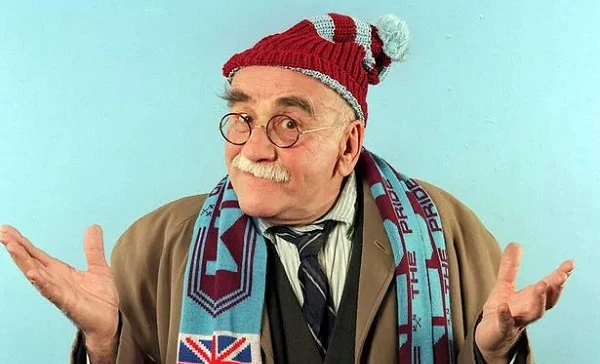
That was the heart of the matter for Mitchell. Although technically Jewish, he had been bothered by the occasions his religious expectations impacted his choices in life and he eventually veered away from religion, becoming a member of the British Humanist Association, holding staunchly socialist views. Garnett’s views were a million miles from Mitchell’s own (he was even a Tottenham fan, in contrast to Alf’s devotion to West Ham). But while audiences laughed, he knew full well that there were some who concurred wholeheartedly with Alf’s opinions. Challenged on entertaining such people, he contested that, ‘except there is all the others who would like to be entertained as well, and why should I modify my performance for the sake of a few narrow-minded bigots!’ It’s fair to say that the debate around Alf Garnett will continue as long as comedy exists.
When Speight died, Garnett was retired as Mitchell didn’t wish to continue the role without his creator. However, Mitchell continued to work and earned rave reviews for a number of hefty stage roles. A nagging back condition, transverse myelitis, caused him spinal problems for his later years, compounded by a stroke, but despite his health issues he was a huge success in Visiting Mr Green, a stage production about a cantankerous Jewish widower. Mitchell admitted that while his views were nothing like Garnett’s, he certainly could be considered somewhat challenging. His wife even said, ‘You are like that awful Alf Garnett only he’s funny and you’re not.’

Warren Mitchell’s health eventually gave up in 2015 shortly before his 90th birthday. While people will always debate the effectiveness of using a Garnett character to mock the bigots of the world, Mitchell will be remembered as a talented actor whose range went far beyond that of a small-minded pensioner angry at the changing world around him. Richard Burton, during Mitchell’s This Is Your Life, described Mitchell as, ‘possibly the only great actor to have come out of television.’ And if Alf is his real legacy, well then Mitchell himself will be remembered forever more.
Published on February 8th, 2024. Written by Brian Slade for Television Heaven.







